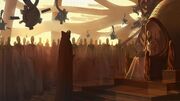For simplicity in the game, it is simply called the "Academy". In fact, it represents a fairly large and complex series of guilds and "horizontal" organizations that deal on an equal footing with all of the nations in the galaxies of Endless Space.
Origins[]
Besides the various factions and the legacy of the Endless, there is a third key element in the development of intergalactic civilization. This element is the various acadamies, known variously as Academies, Centers, Guilds, Brotherhoods, Associations, and Conferences. They all share the goal of developing their own area of expertise and increasing, to varying extents, their political and financial power.
Academy development came as a combination of several factors:
The United Empire′s corporate model of space colonization.

Due to the cutthroat nature of contracts and development of new systems, very little information is shared between Corporations. For political reasons they are loathe to turn over too much valuable knowledge to the Emperor and thus bring more power to the center; for practical reasons they are very careful about sharing precious knowledge with competitors. As a result, Academies were established whose members focused solely on the advancement of ′horizontal′ technical expertise in any one of a number of domains – construction technology, finance, ship development, life sciences, logistics and transport, materials science, project management, xenobiology, marketing... In fact, almost any domain where shared knowledge is of value will have some Academy or sub-chapter dedicated to it.
The Pilgrims′ scattered and anarchic society.

To improve communication between different systems and habitats and to aid in the sharing and expansion of Pilgrim technology, "Learning Management Initiatives" sprung up throughout Pilgrim-controlled space. Initially free and open centers for the sharing of information, as they branched out into pure research and applied research the requirement for funds to keep operations going drove them to charge for access and services. It was a natural fit with the United Empire′s guild structures, and in areas where a relatively stable peace between the two factions existed Academy formation accelerated.
The Sophons′ university research system.

While the Sophons are great seekers of knowledge and lovers of technology, their individual egos often make general advances unexpectedly slow. Autocratic professors in ivory tower research facilities may guard information and discoveries that could have greatly advanced equally important efforts that were going on in parallel elsewhere. While individual geniuses fought to maintain these citadels of secret knowledge, it was clear to the public that greater sharing would aid Sophon society in leapfrogging forward at a more rapid pace. What evolved from this stalemate were licensing and patenting centers whose very nature was to jealously guard and track science and technology and ensure that the deserving party received both accolades and cash for the use of their ideas. In fact, much of the data architecture that underpinned these centers was adapted directly by the Academies to monetize their knowledge once the Sophons became part of intergalactic society.
The Hissho′s relative disdain for academic and intellectual pursuits.

Though the Hissho prize valor and honor above all, they are not fools. Two warriors of equivalent skills cannot fight an ′equal′ duel if one of them has superior technology. Therefore, while the pursuit of scientific advances could hardly be viewed as a desirable way to rise within the society, those who had access to such knowledge had clear advantages. As a result, friendly clans and regions began early on to share resources for development and research. Once a planetary government became established these centers merged and grew. However, as researchers had always been viewed as lesser beings having lesser value and importance, they could hardly be faulted for joining intergalactic Academies once this possibility arrived.
The Sowers' desire to pursue their Calling with maximum efficiency.

When the Sowers reached out into galactic space and found it populated with civilizations that were not the Endless, a period of confusion followed (several nanoseconds, in fact). Their innate pragmatism, however, quickly drove them to look upon these lesser aliens as potential tools to help with their master plan. Once they saw that they were relatively weak in certain areas of science and technology, they adopted the forms and structures of the Academies and openly traded their skills in return for the ability to study and learn from other experts. Academies are not merely tolerated by the Sowers; they are in fact viewed as an important way to speed up their efforts.
The Amoebas' desire to open channels for trade and communication.

Though the Amoeba′s long-term goal may be to understand everything in order to better control it, their short-term goals emphasize communication and diplomacy. They always understood the value of information, and from an early phase of their evolution and development had systems in place to share and develop it. It was a natural fit for them to extend this into intergalactic organizations with the same goal, though there is always some reticence in regards to Amoeba members of guilds and exactly what power they are ultimately serving. It is no secret that most faction governments supported the development of the Academy model as a way to keep an eye on the increasing power and independence of corporate and military structures in their far-flung empires. On the other hand, distant and relatively autonomous systems view the academies as a useful way to share and obtain information without having to clear the bureaucratic and security hurdles of their faction or spend precious time and resources investing. As a result, Academies have embassies, safe houses, dedicated dock facilities, research centers, and schools across the developed space of most factions. Even, in certain cases, the Cravers.
The Horatios' need to constantly please their capricous Emperor.

It is not easy being a clone of a person that views themselves as a mortal god. For the average Horatio, who by definition is as similar as possible to the original, it is hard to differentiate oneself. This problem extends to the work environment, due to the fact that a race of clones has a strong tendency to come up with similar ideas and similar solutions to problems. Cleverer or more daring Horatios who were bold enough to hire these extraterrestrials soon discovered that the Academies were a gold mine of profitable, practical, and above all new ideas. While the Heroes that are recruited are often kept at arms length (who would rub shoulders with something as ugly as an alien?), their skills and experience are highly valued and the Horatio leaders are more than happy to recruit them.
Academy types[]
Administrator[]
Heroes from these Academies are hired for their ability to improve production, whether of buildings or crops. They have expertise in the management of systems, urban planning, low-risk long-term project deployment, logistics, and in practical social applications of scientific research.
These heroes are generally employed to help manage and govern solar systems where help is needed in industrial production and agricultural development.
Corporate[]
These Academies are excellent for both developing and applying science, and for improving the profitable exploitation of resources. This is due to their skills in high-risk project finance and management, product pipeline management, and both mass-market and luxury goods marketing.
These heroes are most useful to help manage and govern solar systems where help is needed in scientific and economic development.
Commander[]
The heroes from these Academies may or may not be battle-scarred, but they are certainly experts in organizing and leading fleets and/or ground troops into battle. Particularly skilled at long-term strategic engagements, they have the greatest skills in logistics, planning, communication, and organization and are inspirational leaders.
These heroes are, of course, hired to act as admirals in fleets or to bolster defenses in key systems.
Pilot[]
Often having moved up through the ranks of one of the great warring factions, these heroes are exceptional at winning individual battles and military engagements. With great battle experience, they are skilled in maneuvers, attacks, formations, feints, and have unparalleled situational awareness and tactical reflexes in space and on the ground.
These heroes are hired to give the edge in battles, whether in space or on the ground.
Adventurer[]
These heroes come from any number of different walks of life – corporate intelligence and security, government intelligence and black operations, ex-military or mercenary organizations, and even powerful underworld organizations. Their talents are in doing what must be done, even if it requires dangerous and unethical behaviour...
The skills of these heroes are active and operational rather than passive and strategic, and can be useful both as Governors and Admirals.